When silence falls on the library at night after a long, bustling day at school...
... then there is a sudden crackle and crunch and hustle .... Out of 1000 books they crawl and rush, jump and hop, scurry and scuttle cheerfully – the Famous Five and the Pretty Little Liars, the Secret Unicorns and the Magical Peppers, Tom Sawyer and Huckleberry Finn, Moby Dick, Anne of Green Gables, the Harrys and Hobbits and witches and wizards, the horse riders and fairy elves, the Lottas and Gregs, the Royals, the Horse Whisperers and Bodyguards, the chewing-gum chewing teenagers who just fell in love, the Samurai, the time thieves, fraudsters and commissioners, the princes and princesses, caliphs and storks, Mogli together with Balu, Ka and Bagira, Alladin, Mary Poppins, Winnetou and Old Shatterhand, Mephisto and Emilia, the Gauls and the Romans, and finally the Helenes and Spartans, all climb down from Olympus together with the gods to dance with Malory Towers, the Twins at St Clare’s, the Warrior Cats, Roald and his Charly the super-sweet-muddy-mushy-brown-yummy chocolate dance to the music of the Hunger Games and over the Throne of Glass, right through the school of magical animals and disappear with the first daylight again in an emerald-green Tree House.
But since the library is unfortunately closed at night and you are denied this wonderful, fairy-tale, nocturnal spectacle, you still have the opportunity to get to know all these wonderful characters...
Just come and borrow them - every school day during the big breaks and in the afternoons... We look forward to seeing you!
Your library teamThe library is available free of charge to all DHPS learners and employees.
The library team, a qualified school librarian and an assistant, ensure professional advice to the visitors.
In addition to usual librarian tasks, special focus lies on supporting learners with their Internet- or project-related researches.
At the DHPS library, ample space is provided to read and learn and the computer-, group-, and quiet working zones are perfectly adapted to the needs of our younger and older learners.
The DHPS library material consists of the following:
- The school library offers an extensive range of reading- and learning-materials and is open during school-time and in the afternoons.
- The teacher library comprises 3000 media which are available to DHPS teachers.
- The third section, the so-called “free teaching aids” comprises text books for lessons and reading material for language lessons (in class sets).
Library opening hours:
|
Monday - Thursday
|
06h50 - 13h20 and 14h00 - 16h00
|
|
Friday
|
06h50 - 12h30
|
For further information please feel free to contact:





